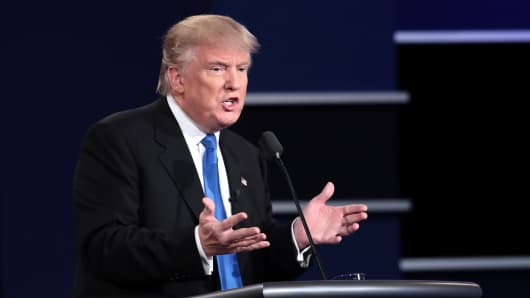The Donald Trump campaign may be spending the hours after this debate pondering two missed opportunities that presented themselves during this opening contest with Hillary Clinton.
One was a singular moment in the debate where accusations that Trump is a racist emerged and Trump failed to deliver a winning response. The second was Trump's failure to tie Clinton to Wall Street.
Probably the most common anti-Trump narrative promoted by the Clinton campaign and its supporters in the last two months has been the accusation that the Republican presidential nominee as a racist. Trump had a chance to finally rebut that tonight, but he may have waited too long to deliver the best part of that rebuttal.
After Hillary Clinton reminded the voters that Donald Trump was once sued for discriminatory housing policies, Trump spent most of his response time explaining that he was only one of many defendants in that suit and he reached a "no fault" settlement. It wasn't until the final moments of that response that Trump briefly referred to how he broke a long tradition of racial and religious discrimination in Palm Beach golf clubs by insisting that all people be admitted to the club he built there decades ago.
In the journalism business, we call that "burying the lede." An emotional story like that about breaking that barrier should have been slowly and clearly described by Trump with plenty of emotional trigger words. Instead, he almost glossed it over.
It seems that Clinton has successfully put Trump on the defensive in many of the exchanges so far in the debate, getting him to immediately respond to the last statements she's made instead of getting into his own talking points. But it may have been mostly damaging when he took too long to connect with so many people who don't know his Palm Beach story and are now likely to never get the full narrative.
When Clinton was the first candidate to mention Wall Street and the financial crisis, Trump had a golden opportunity to respond by mentioning the fact that Wall Street and its biggest donors are uniformly behind her. It's not that Trump isn't aware of that, but here, too, it seems like he got bogged down defending the smaller points of the attacks against him instead of going after the bigger picture. At the beginning of the debate, Trump did a much better job of describing the nation's general problems. He genuinely seemed more concerned and serious about them than Clinton. But then he veered off into too many sidetrack defensiveness.
Trump will obviously have two more chances in the upcoming pair of debates to correct this. In the meantime, we'll see if his inability to cash in on them in this first contest costs him permanently in the polls.



